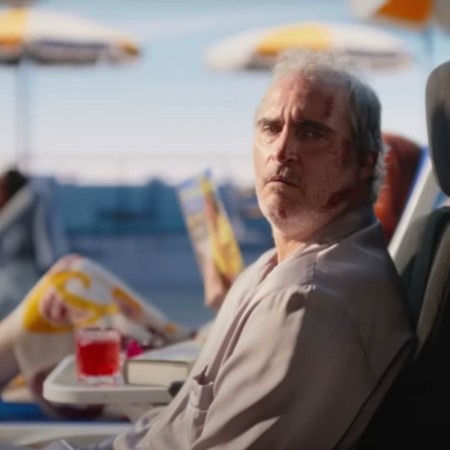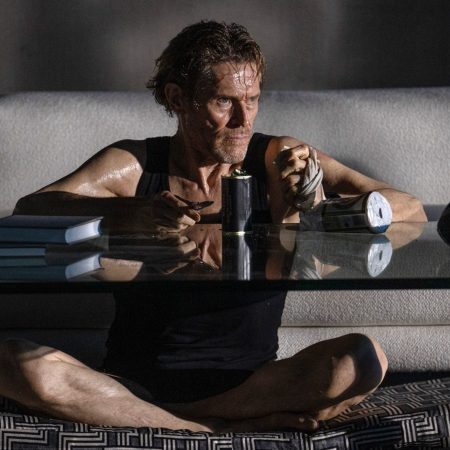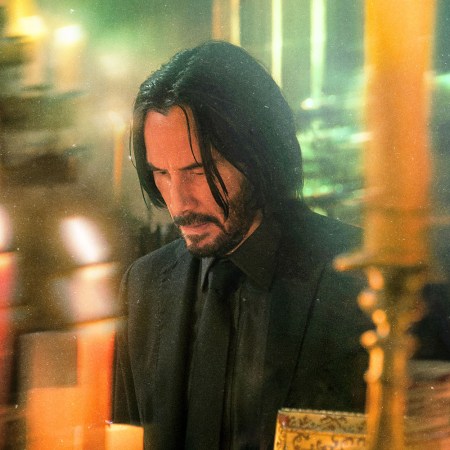Sean, the unlikely protagonist portrayed by David White in his feature debut as writer-director This Town, is a mild-mannered sort of guy. Women make him a tad nervous, evident in the awkward yet sweet intro he records for a video-dating service, soundtracked by the tinny keyboard music he composes himself as a hobby. He just wants someone he can feel comfortable around, someone he can bring to his New Zealand hamlet’s finest and only Chinese buffet to share in his self-designed delicacy of fried rice over french fries. His is the soul of a lover, or at least it would be, if he could only find the right woman. Ideally, that woman would be unfazed by the whole thing where he was accused — and acquitted, he’s quick to mention — of slaughtering his entire family a little while back.
No matter how a person describes the basic setup for the film, the synopsis ends with an unavoidable kicker conveying the offbeat genre-mixing at play. Make it sound like an indie romcom about a weirdo finding the one, and his alleged body count comes out of nowhere. In the early stages of getting his production off the ground, however, White preferred to take the opposite tack.
“In pitching, I’d say that I wrote a film about a guy accused of killing his whole family and finding love and explain everything, and then add, ‘And it’s a comedy!’” he tells InsideHook from his home in New Zealand. “Then there’d be an uncomfortable moment of silence, and a laugh once they realized I wasn’t joking. It could’ve been a serious drama, but it’s all comes down to the direction you take it in.”
White now enjoys the added benefit of knowing the forking path he chose was the right one. While his low-budget, lo-fi dramedy about misfits has just received a fanfare-light release in the States (it’s now available on demand), it was an improbable smash in his native land, the first true hit in their brave new world of post-COVID moviegoing last year. He sees the handsome box-office receipts as mere gravy, though. For a film as determinedly small, affectionately wrought and idiosyncratic as this one, simply getting it made is the real victory.
When the initial seedling occurred to him, he had nearly resigned himself to another sort of life entirely. Overseas in business school, he returned to his hometown and family having not worked on anything cinema-related for months.
“I was hanging out at my parents’ farm, trying to figure out what I could do, and I saw a friend of mine, who’s an ex-gang member, and we ended up talking about prejudice,” White recalls. “He’s got a scar on his face, lots of tattoos, and we were talking about what it’s like to walk down the street and see people automatically, silently making a decision about who you are, when he’s one of the nicest people I know … I drove home that day, back to the country, and I imagined what the worst crime in a small town could be, and what it would be like for a person to face the most ridiculous, outsized prejudice. Well, if one’s whole family was murdered, that could be quite problematic.”
“Quite problematic” is the perfect phrase for the morbid premise, in both its ill-fitting politeness and deadpan understatement. The viewer doesn’t learn upfront whether White’s onscreen alter ego Sean really is guilty of the heinous charges he was tried for and cleared of years ago, and so we’re left to make the same uncomfortable decision as everyone who crosses his path: Would you trust someone who probably isn’t a murderer, but might be? The answer is a tentative yes for kindhearted Casey (Alice May Connolly), another lonely soul who sees something of herself in Sean’s isolation from his community, and ignores the warnings of her girlfriends as she strikes up a shy courtship with her fellow outcast. These high stakes spark comic friction with the tone, which puts an affectionately dinky small-town spin on the usual sensationalism of true crime. The dogged reporter (Rima Te Wiata) investigating Sean in hopes of landing material for a best-seller, the closest thing the film has to antagonist, is really more of a harmless boob.
The unexpected warmth of his approach came from his intimately personal connection to the subject matter. White may not have ever beat a homicide rap, but he does share Sean’s predilection for sweet and sour pork. In his boyhood, that was most edible dish at the town’s sole Chinese joint, one of the many details that would fill in the cozy universe of the film.
“One of the reasons this resonated with New Zealand especially is that for each person I wrote about, there’s a version of that person I’ve known in my life,” he explains. “We’d go to cinemas and speak with audiences afterward, and it’s the same thing, where they can pick out someone they know in every character. The important thing to keep in mind, though, is that I love all these people. They informed my life. And so I don’t feel like I’m taking the piss, as we say in New Zealand, or teasing them. It’s a loving embrace, as you bring them to the world.”
An attunement to a slippery sense of New Zealand-ness could be the X-factor that’s made White’s film a sleeper sensation at home and a proud representative of the national film culture when exported abroad. He handpicked locals from his sleepy suburb of Hawke’s Bay to fill out the cast, any supermarket checkout clerk with a memorable face welcome to add their bit of verisimilitude. The sense of regional specificity also runs deeper than that, deciding the obscure frequency to which White’s comedic sensibility is attuned. “In New Zealand, we’re a bit self-deprecating by nature, and so I think a lot of our humor is underplayed, self-effacing,” he says.

He guesstimates that he’s seen Napoleon Dynamite 15 times, and it shows, yet his toast-dry style has more in common with his countrymen Taika Waititi (White borrowed his regular score composer) and Flight of the Conchords. He sees an inherent comedy in strange bits of banality: retro synthesizers, tacky horse-girl bedroom decor, a ramshackle petting zoo. He’s fascinated by things out of place, an affinity for oddity reflected in his own personality. “Every time you make something, you wonder if it’ll be the last thing you ever make,” he says. “Especially if you’re putting out something more left-field. Though it was funny — when I showed this to my friends, they said, ‘We thought it would be weirder, David, knowing you!’ That came as a relief. At least, I think it did.”
Judging by the three weeks the film spent at #1 in New Zealand, it was just weird enough (though it might have helped that buying a ticket felt like a patriotic duty for audiences fresh out of the five-week lockdown that got the secluded island on the fast track to beating the pandemic before anywhere else). “We were the first New Zealand film to go back in person, and we were part of a large campaign to encourage people to return to the cinema,” he says. “‘Hey, remember that thing, you went every week? Start doing that again!’” He had the good fortune of premiering at a time when daily life had “pretty much gone back to normal,” excepting only the occasional mini-outbreak and attendant quashing. A publicity tour was cut short when cases were reported in Auckland and all business ground to a halt, leaving White and his actor Robyn Malcolm at a pub, dumbfounded by the text messages informing them to head home immediately.
His unusual story has a happy ending, as the little auteur that could powered his way to an industry platform from which the rest of the globe can take notice. He’s now “on the precipice” of his next thing, a TV series to be announced within the next couple months, and he’d like to expand This Town to series length for an American viewership as well. (“There’s a lot more to mine within these characters,” is all he’ll say about what shape that might take.)
All the while, his hungrier ambitions haven’t overshadowed the gracious appreciation he has for the success he’s found thus far. The tense pause he remembers from the pitch meetings won’t be a problem next time around; now, everyone’s in on his joke. “When you put a film like this into the world, all you can do is hope that it finds the right audience,” he says. “You want people to love it, but you can only control what you do, so you just try to make something new and interesting.”
This Town is now available to stream via indie streaming service Topic. Learn more here.
This article was featured in the InsideHook newsletter. Sign up now.






















